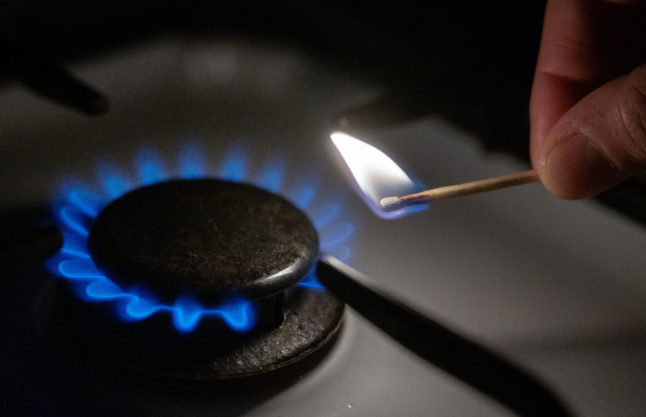What does Germany's gas VAT cut mean for you?

Germany is set to lower the tax on gas consumption to seven percent instead of the current 19 percent. But there are also extra charges on the way. We look at what it all means for customers.
What's happening?
The German government announced last week that value-added tax (VAT) on gas consumption is to be cut in a bid to relieve the burden on customers.
The plans are for VAT on all gas bills - i.e. not just the levy - to be reduced from 19 to seven percent until the end of March 2024.
This reduced tax rate normally applies to certain basic goods such as food.
READ ALSO: Germany plans to slash VAT bills to seven percent
The government had originally wanted to remove the obligation to pay VAT entirely, but this was not allowed under the EU's strict rules.
However, Germany also said last week that gas suppliers will be allowed to add 2.419 cents per kilowatt hour to the price of gas from October onwards to help them cope with hugely increased procurement costs.
Around half of all households in Germany have gas heating.
READ ALSO: How much will Germany's gas levy cost you?
How does the VAT cut affect the surcharge?
Unfortunately, it looks like bills will still go up - even with the VAT cut. As well as the levy, gas suppliers are hiking up their costs in general so this will also cause misery for households in Germany.
But let's look at how slashing the VAT affects the gas surcharge.
The tweet below by Berlin-Brandenburg broadcaster RBB states: "From October, a gas levy of 2.419 cents per kilowatt hour will be payable.
"This is intended to secure gas supplies and support import costs. Even with the VAT reduction on gas, this means additional costs for many households."
The table from RBB (click on the link to see the full table in the tweet) gives an idea of the price increases customers in Germany will see with the gas surcharge and VAT cut as prices stand at the moment.
For example, a person in a 40 square metre home using an average of 5,600 kilowatt hours per year for heating and hot water could have to pay €144.95 extra per year or €12.08 more a month.
Consumers in a 70 square metre home using around 9,800 kWh per year may have to fork out €253.66 extra a year. A family living in a 120 square metre home using about 16,800 kWh a year could have to pay €434.84 extra per year.
Ab Oktober wird eine #Gasumlage in Höhe von 2,419 Cent pro Kilowattstunde fällig. Damit sollen #Gasversorgung gesichert und Importkosten gestützt werden. Auch mit der #Mehrwertsteuersenkung auf #Gas bedeutet das für viele Haushalte: Mehrkosten. #Gaspreis pic.twitter.com/rXu9g7tTnT
— rbb|24 (@rbb24) August 22, 2022
Wait - but aren't there savings on the rest of the bill?
Yes. This is where it all gets a bit complicated. The VAT cut applies to the whole gas bill, not just the levy. But people will still have to pay more for gas in general.
Currently, a sample household with a gas consumption of 20,000 kWh per year pays a total of €3,717, according to comparison portal Check24.
If the VAT drops to seven percent, these costs are reduced by €375 to a total of €3,342.
But there are additional costs. From October 1st the new gas charge of 2,419 cent per kilowatt-hour applies. For the sample household - an extra €518 is added to their bill - that includes the VAT of seven per cent.
Without the reduction of the VAT, the extra costs would be €576. By lowering the VAT on gas the household would be relieved altogether by around €433.

A person places money in a piggy bank in Germany. Photo: picture alliance/dpa/dpa-Zentralbild | Patrick Pleul
In the example of the sample household, the consumer would pay more from October onwards - even though the VAT on all gas is lowered. According to calculations by German broadcaster Tagesschau, it works out that the family would pay an additional €143 per year.
However, this is based on current gas prices, which are likely to rise. Yes, we have a headache trying to work out what all this means, too!
Where does the price of gas stand currently?
In wholesale, a megawatt hour of gas for delivery in September costs €235 - that's according to the contract for Dutch TTF gas. In August a year ago, the price was around €26. A German household with an annual consumption of 20,000 kWh paid an average of €1,306 in August 2021 - while it is currently €3,717.
Regardless of the further development of market prices, experts believe consumer prices for natural gas will continue to rise. This is because wholesale prices are in some cases significantly higher than what gas customers are currently paying.
Higher prices will particularly affect people who are not on a price guarantee contract or are coming to the end of a contract.
What else are we paying for?
According to Tagesschau, in addition to the gas surcharge and the rocketing gas prices, consumers will have to pay two more surcharges starting in October: the control energy surcharge will be 0.57 cents per kilowatt hour, and the gas storage surcharge will be 0.059 cents per kilowatt hour.
Control energy is used to keep the gas network stable. A household with an annual consumption of 20,000 kilowatt hours will then have to reckon with additional costs of just under €135 per year for balancing energy and gas storage filling, with seven percent VAT. The surcharges are in addition to the gas levy of 2.419 cents (excluding VAT) per kilowatt hour.

A gas flame on a stove. Germany is struggling with a huge energy crisis. Photo: picture alliance/dpa | Marijan Murat
What financial support is there?
All workers in Germany will receive a one-off taxable payment of €300 from September. Those who are employed will receive the energy allowance via their employer. Self-employed people can receive it via the advance tax payment for the third quarter.
In order to relieve lower-income households, recipients of housing allowance are to receive a one-off heating cost subsidy. Those living alone will receive €270, according to a draft bill from the German government.
Two-person households are to receive €350, with €70 more for each additional person in the household. Students, trainees and other eligible people will receive a one-off heating allowance of €230.
Are there any other assistance measures planned?
The German government is currently preparing a third relief package. There are plans for assistance with housing subsidies and tax relief. A permanent heating allowance for low-income households is also in the works.
READ ALSO: Germany’s Scholz pledges more relief for lowest earners
Comments
See Also
What's happening?
The German government announced last week that value-added tax (VAT) on gas consumption is to be cut in a bid to relieve the burden on customers.
The plans are for VAT on all gas bills - i.e. not just the levy - to be reduced from 19 to seven percent until the end of March 2024.
This reduced tax rate normally applies to certain basic goods such as food.
READ ALSO: Germany plans to slash VAT bills to seven percent
The government had originally wanted to remove the obligation to pay VAT entirely, but this was not allowed under the EU's strict rules.
However, Germany also said last week that gas suppliers will be allowed to add 2.419 cents per kilowatt hour to the price of gas from October onwards to help them cope with hugely increased procurement costs.
Around half of all households in Germany have gas heating.
READ ALSO: How much will Germany's gas levy cost you?
How does the VAT cut affect the surcharge?
Unfortunately, it looks like bills will still go up - even with the VAT cut. As well as the levy, gas suppliers are hiking up their costs in general so this will also cause misery for households in Germany.
But let's look at how slashing the VAT affects the gas surcharge.
The tweet below by Berlin-Brandenburg broadcaster RBB states: "From October, a gas levy of 2.419 cents per kilowatt hour will be payable.
"This is intended to secure gas supplies and support import costs. Even with the VAT reduction on gas, this means additional costs for many households."
The table from RBB (click on the link to see the full table in the tweet) gives an idea of the price increases customers in Germany will see with the gas surcharge and VAT cut as prices stand at the moment.
For example, a person in a 40 square metre home using an average of 5,600 kilowatt hours per year for heating and hot water could have to pay €144.95 extra per year or €12.08 more a month.
Consumers in a 70 square metre home using around 9,800 kWh per year may have to fork out €253.66 extra a year. A family living in a 120 square metre home using about 16,800 kWh a year could have to pay €434.84 extra per year.
Ab Oktober wird eine #Gasumlage in Höhe von 2,419 Cent pro Kilowattstunde fällig. Damit sollen #Gasversorgung gesichert und Importkosten gestützt werden. Auch mit der #Mehrwertsteuersenkung auf #Gas bedeutet das für viele Haushalte: Mehrkosten. #Gaspreis pic.twitter.com/rXu9g7tTnT
— rbb|24 (@rbb24) August 22, 2022
Wait - but aren't there savings on the rest of the bill?
Yes. This is where it all gets a bit complicated. The VAT cut applies to the whole gas bill, not just the levy. But people will still have to pay more for gas in general.
Currently, a sample household with a gas consumption of 20,000 kWh per year pays a total of €3,717, according to comparison portal Check24.
If the VAT drops to seven percent, these costs are reduced by €375 to a total of €3,342.
But there are additional costs. From October 1st the new gas charge of 2,419 cent per kilowatt-hour applies. For the sample household - an extra €518 is added to their bill - that includes the VAT of seven per cent.
Without the reduction of the VAT, the extra costs would be €576. By lowering the VAT on gas the household would be relieved altogether by around €433.

In the example of the sample household, the consumer would pay more from October onwards - even though the VAT on all gas is lowered. According to calculations by German broadcaster Tagesschau, it works out that the family would pay an additional €143 per year.
However, this is based on current gas prices, which are likely to rise. Yes, we have a headache trying to work out what all this means, too!
Where does the price of gas stand currently?
In wholesale, a megawatt hour of gas for delivery in September costs €235 - that's according to the contract for Dutch TTF gas. In August a year ago, the price was around €26. A German household with an annual consumption of 20,000 kWh paid an average of €1,306 in August 2021 - while it is currently €3,717.
Regardless of the further development of market prices, experts believe consumer prices for natural gas will continue to rise. This is because wholesale prices are in some cases significantly higher than what gas customers are currently paying.
Higher prices will particularly affect people who are not on a price guarantee contract or are coming to the end of a contract.
What else are we paying for?
According to Tagesschau, in addition to the gas surcharge and the rocketing gas prices, consumers will have to pay two more surcharges starting in October: the control energy surcharge will be 0.57 cents per kilowatt hour, and the gas storage surcharge will be 0.059 cents per kilowatt hour.
Control energy is used to keep the gas network stable. A household with an annual consumption of 20,000 kilowatt hours will then have to reckon with additional costs of just under €135 per year for balancing energy and gas storage filling, with seven percent VAT. The surcharges are in addition to the gas levy of 2.419 cents (excluding VAT) per kilowatt hour.

What financial support is there?
All workers in Germany will receive a one-off taxable payment of €300 from September. Those who are employed will receive the energy allowance via their employer. Self-employed people can receive it via the advance tax payment for the third quarter.
In order to relieve lower-income households, recipients of housing allowance are to receive a one-off heating cost subsidy. Those living alone will receive €270, according to a draft bill from the German government.
Two-person households are to receive €350, with €70 more for each additional person in the household. Students, trainees and other eligible people will receive a one-off heating allowance of €230.
Are there any other assistance measures planned?
The German government is currently preparing a third relief package. There are plans for assistance with housing subsidies and tax relief. A permanent heating allowance for low-income households is also in the works.
READ ALSO: Germany’s Scholz pledges more relief for lowest earners
Join the conversation in our comments section below. Share your own views and experience and if you have a question or suggestion for our journalists then email us at [email protected].
Please keep comments civil, constructive and on topic – and make sure to read our terms of use before getting involved.
Please log in here to leave a comment.